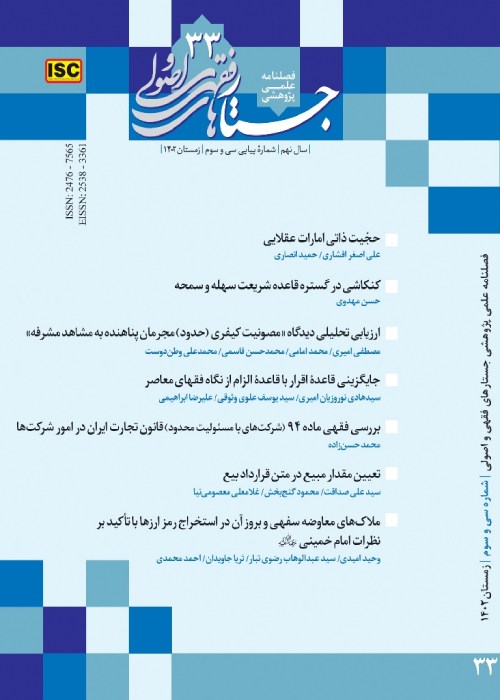Replacing the Principle of Iqrār with Ilzām from the Point of View of Contemporary Jurists
The Principle of Iqrār (Confession) is one of the jurisprudential principles that includes how the Imāmīyyah relates to other religions and even non-Muslims. Āyatullāh Sīstanī does not accept the Principle of Ilzām (Obligation) in its common sense among Shīʻī jurists, and he does not consider the implication of the aḥādīth of this chapter to be limited to this principle. Rather, according to these aḥādīth, he replaces it with the two other Principles of Iqrār and Muqāṣṣat al-Nawʻīyyah. The Principle of Iqrār has an important and facilitating role in regulating the relations between Shīʻahs and followers of other Islamic religions and sects, as well as at higher levels, in regulating the relationship between the Shīʻah or Muslim governments with non-Muslim or disbelieving governments. In fact, the Principle of Iqrār is the same as signing or respecting the laws of other religions and schools of thought for a peaceful life. The Principle of Muqāṣṣat al-Nawʻīyyah also implies a similar social confrontation or a similar movement at the level of power and sovereignty. In Imāmī jurisprudence, the Principle of Iqrār as a jurisprudential and legal principle – public and private – is the harbinger of pure peace in international and inter-religious relations. In fact, by disapproving the Principle of Iqrār narrations in the well-known sense among the jurists and also disapproving its generalization and the manifestation of the rational Principle of Iqrār or Muqāṣṣat al-Nawʻīyyah of these narrations, Āyatullāh al-Sīstanī denies the appearance of these narrations in a devotional principle for the benefit of the followers of Imāmīyyah. He tries to give a universal interpretation of these narrations. This reading of the Principle of Iqrār is more compatible with justice and coexistence with other religions. The non-generality of the Principle of Iqrār and also the non-contradiction of the Principle of Ilzām with the Principle of Iqrār and the manifestation of both principles are among the controversies in this principle.
- حق عضویت دریافتی صرف حمایت از نشریات عضو و نگهداری، تکمیل و توسعه مگیران میشود.
- پرداخت حق اشتراک و دانلود مقالات اجازه بازنشر آن در سایر رسانههای چاپی و دیجیتال را به کاربر نمیدهد.



